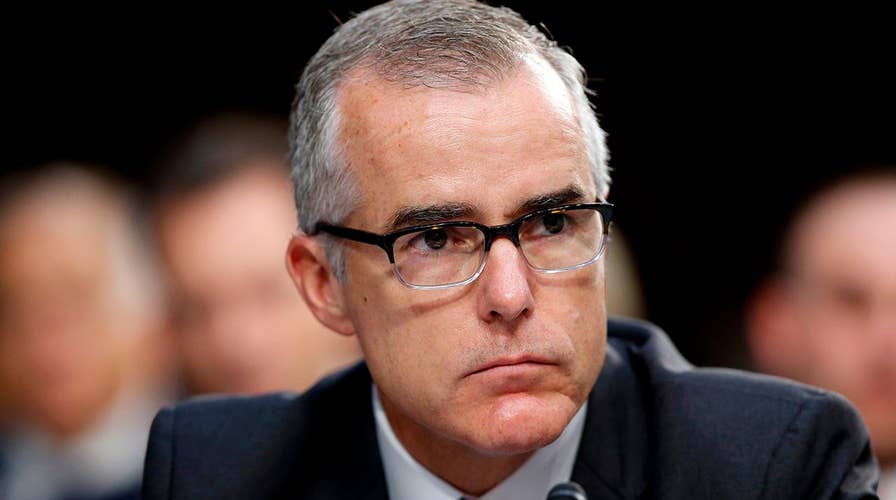McCabe says Mueller report validates choices FBI made on Russia probe
Former Deputy Director of the FBI Andrew McCabe praises the Mueller report after its public release. Fox News contributor Dan Bongino explains why he's wrong.
Former FBI Deputy Director Andrew McCabe on Thursday called for Congress to “absolutely” move forward with an impeachment inquiry into President Trump, signaling that he believes it is moving too slowly with the process.
During an interview with CNN’s John Berman, McCabe called for Congress to begin impeachment proceedings and said that lawmakers are obligated to do so.
HOUSE DEMS PLAN NEW WAVE OF RUSSIA HEARINGS AMID IMPEACHMENT CHATTER
“I think Congress should absolutely move forward with their constitutional obligation to have this information heard,” McCabe said. “The only thing that’s clear to me right now, John, is that Congress has an obligation to air out exactly what is known by the government about the president’s conduct. And they should do that by calling witnesses.”
McCabe went on to criticize the White House, saying it is “trying to delay and obstruct and bind up” the process.
“They’re clearly very concerned about the public at large hearing in a vivid and compelling way the information that was revealed by the special counsel,” McCabe said.
When asked if he thought Congress was moving too slowly, he suggested lawmakers could be making more progress.
“I think that they should be moving forward. I think they should be moving forward in a deliberate and careful fashion,” he replied. “They claim to be doing that. But it would be—I think it would be good for them to make a little more progress.”
McCabe’s calls for impeachment proceedings come amid a battle between congressional Democrats and the White House over access to documents and testimony from current and former administration officials.
Rank-and-file congressional Democrats have also intensified their calls for impeachment since former Special Counsel Robert Mueller made his first and only public statement last month to mark the conclusion of his investigation and the closing of his office. He maintained that there was “not sufficient evidence to charge a conspiracy” with regard to whether members of the Trump campaign coordinated with the Russian government during the 2016 presidential election.
But Mueller left open the question of whether the president obstructed justice.
“If we had had confidence that the president clearly did not commit a crime, we would have said that,” Mueller said. “We did not determine whether the president did commit a crime.”
HOUSE VOTES TO HOLD BARR, MCGAHN IN 'CONTEMPT,' WITH ANOTHER VOTE EXPECTED SOON
Mueller explained longstanding Justice Department policy, which states a sitting president cannot be charged with a crime, and thus said “charging the president was not an option we could consider.”
Mueller added that “it would be unfair to accuse someone of a crime when there could be no court resolution of the charge.” Mueller said that while the Office of Legal Counsel (OLC) opinion blocks a president from indictment while in office, “the Constitution requires a process other than the criminal justice system to formally accuse the president of wrongdoing.”
Many congressional Democrats took Mueller’s comments as a green light to ramp up talks on impeachment proceedings against the president -- despite House Speaker Nancy Pelosi’s reluctance.
Since Mueller’s comments last month, the House approved a civil enforcement resolution that Democrats say effectively holds Attorney General Bill Barr and former White House Counsel Don McGahn in contempt of Congress.
The resolution does not use the word "contempt," and could be seen as part of Democrats' ongoing two-track effort to avoid embracing sensitive matters like impeachment or contempt while keeping them on the table. Instead, the resolution empowers House Democrats to use the services of the House counsel to take their subpoena fight against Barr and McGahn to court and also gives congressional committee chairs the ability to unilaterally "initiate" judicial proceedings to enforce future subpoenas in federal court.
Meanwhile, McCabe was promoting his new book, “The Threat.” McCabe served as deputy FBI director when James Comey was leading the bureau. Upon Comey’s firing in May 2017, McCabe became acting FBI director. McCabe was fired by former Attorney General Jeff Sessions in March 2018 for having made “an unauthorized disclosure to the news media” and “lack[ing] candor” under oath on “multiple occasions.”












































